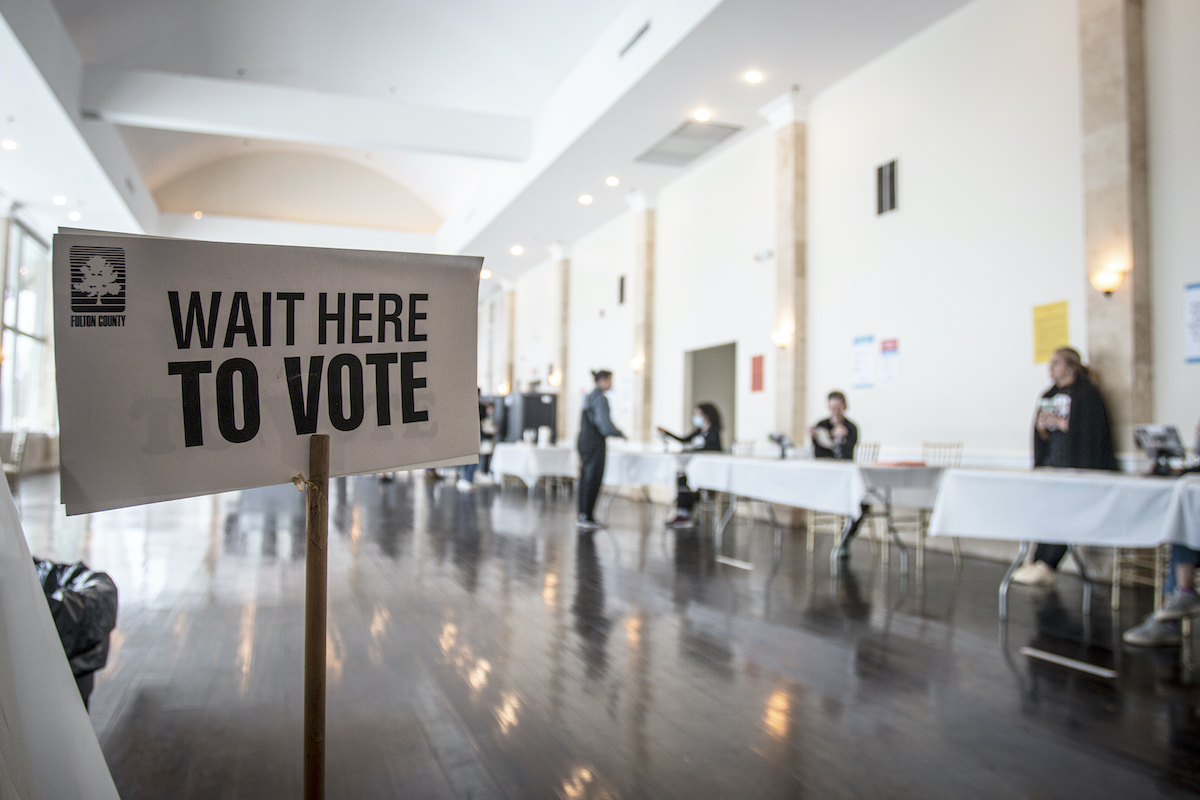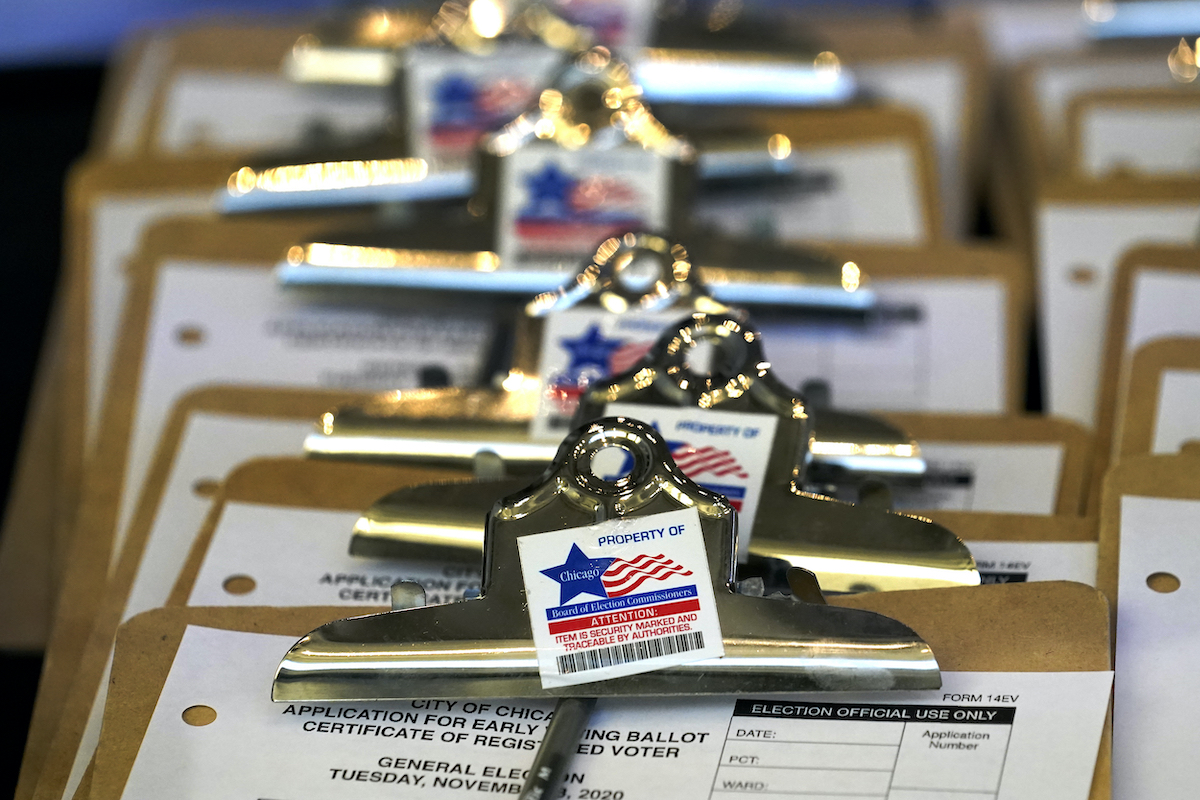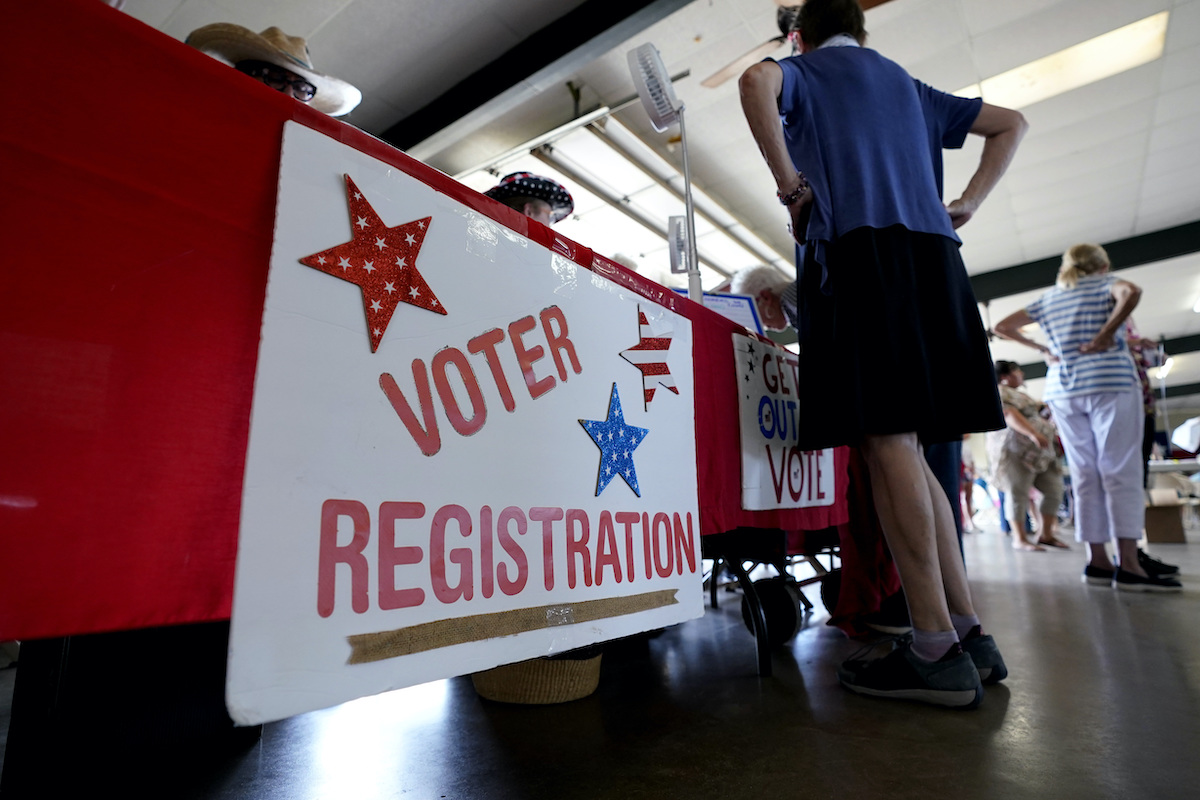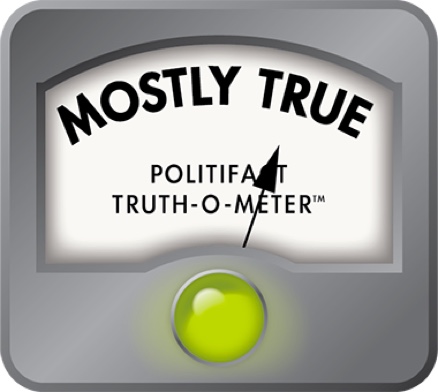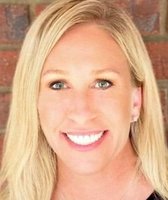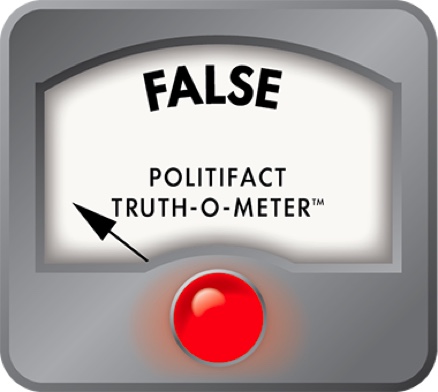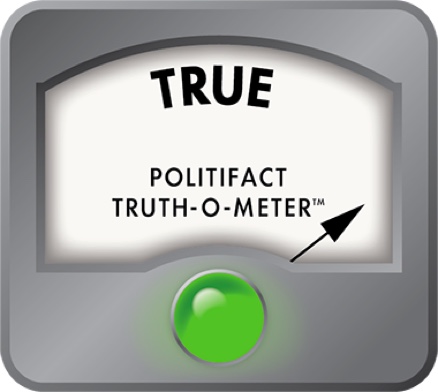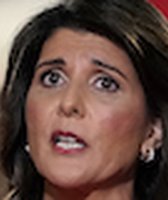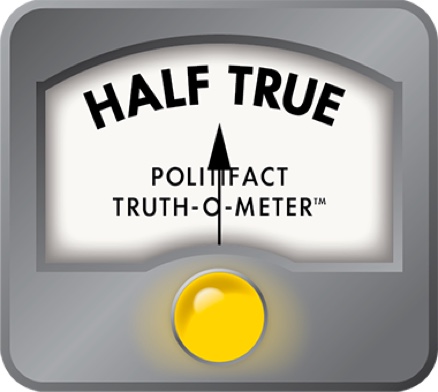Stand up for the facts!
Our only agenda is to publish the truth so you can be an informed participant in democracy.
We need your help.
I would like to contribute
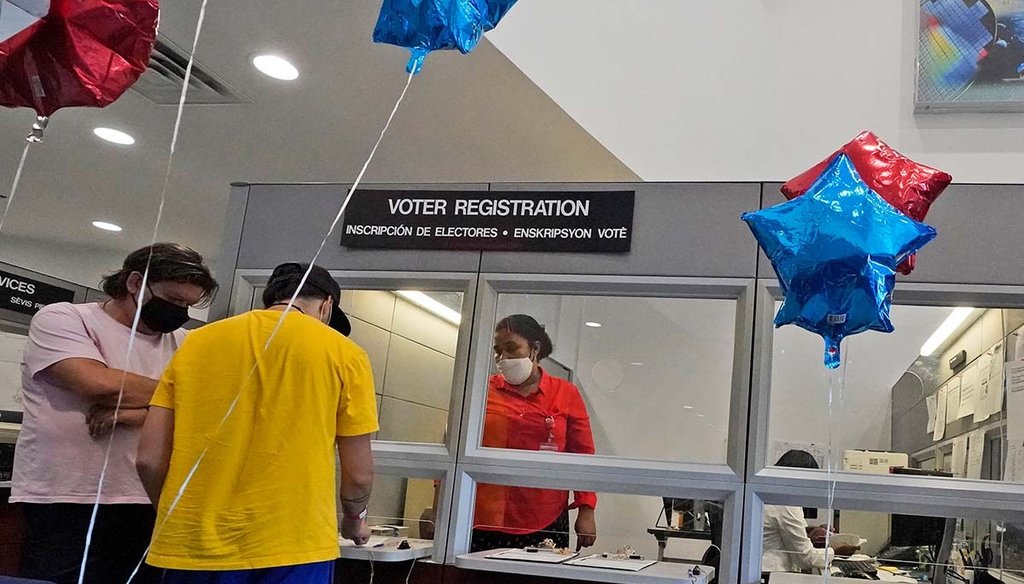
Lucas Saez turns in his voter registration form to temporary worker Loren Quiroz, center on Tuesday, Oct. 6, 2020, at the Miami-Dade County Elections Department in Doral, Fla. (AP)
If Your Time is short
-
In 2012, seven states formed the Electronic Registration Information Center, or ERIC. The partnership, which grew to 33 states plus the District of Columbia, shares voter registration data to clear voter rolls of people who have moved or died.
-
The partnership was targeted with misinformation about its funding in January 2022.
-
Seven Republican-led states have left ERIC since 2022, raising questions about how they will replace the tools they received through ERIC as the 2024 elections approach.
For roughly 10 years, a little-known organization designed to keep U.S. states’ voter rolls in order delivered as promised.
The Electronic Registration Information Center, a partnership among more than half of the states, drew Republican-led and Democratic-led states alike.
From 2013 until February 2023, the center’s database of states’ combined voter rolls flagged more than 35 million voter registrations that appeared to be out of date because people had moved or died or were registered twice. Election officials used that information to remove outdated registrations.
Its successes were evident:
-
In Alabama, the secretary of state said ERIC helped find 222,000 voter records of potential cross-state movers plus tens of thousands of voters who had died or had duplicate registrations.
-
In Florida, ERIC data led to the discovery that 1,177 voters appeared to have voted in Florida and in one of the other member states, in the same election.
-
In South Carolina, an election commission spokesperson said ERIC death data led the state to remove about 24,000 voters since 2020.
Despite its track record, the view of ERIC began to darken in January 2022. That’s when the Gateway Pundit, a conservative website that often spreads misinformation, published an article falsely stating that ERIC was funded by George Soros, a liberal billionaire at the center of multiple conspiracy theories.
A week later, Louisiana announced it would leave ERIC, citing "media reports about potential questionable funding sources" and "possibly partisan actors." In early 2023, six other states followed: Alabama, Florida, Iowa, Missouri, Ohio and West Virginia. Officials in Alaska and Texas have also said their states may leave ERIC. And a proposed bill in Texas would force the state to leave the compact, too.
Georgia Secretary of State Brad Raffensperger, who found himself targeted by numerous false 2020 election claims, sounded baffled by his fellow election officials’ choices.
"States claim they want to combat illegal voting & clean voter rolls," Raffensperger tweeted March 7, "but then leave the best & only group capable of detecting double voting across state lines, @ericstates_info. Reacting to disinformation they’ve hurt their own state & others while undermining voter confidence."
The tweet showed a GIF, a moving internet image, of SpongeBob SquarePants punching himself in the face.
ERIC remains the most comprehensive, efficient data-matching tool to flag outdated registrations. With the 2024 presidential election heating up, do these ERIC departures amount to SpongeBob-level election process self-flagellation?
Polling location workers await a rush of lunchtime voters in the Georgia senate runoff election on Dec. 6, 2022, in Atlanta. (AP)
With no national database of voters, states and local jurisdictions are responsible for maintaining up-to-date voter rolls. This is a challenge because people die or move every day.
"Most people who move don’t tell the election office — we are chasing them," said Eric Fey, the Democratic director of elections in St. Louis County, Missouri, who works alongside a Republican director.
It is not a crime for someone to remain on the voter rolls in two jurisdictions, but it is a crime for a voter to cast two ballots in the same election.
To tackle the challenges of keeping voter rolls current, seven states formed ERIC in 2012 with $139,000 in startup funds from the nonpartisan Pew Charitable Trusts.
ERIC grew over the next decade, peaking at 33 states plus Washington, D.C. Its aim was to improve voter rolls accuracy and increase voter registration with a voluntary member base of states that share information with one another.
These member states — not Soros — fund ERIC and serve on the board. New members pay a one-time fee of $25,000 and annual dues ranging from about $26,000 to $116,000. States spend additional money to send mailers to eligible but unregistered citizens, an ERIC requirement.
ERIC expenditure amounts vary by state, but represent a small slice of overall elections budgets. For example in 2022-23, the Colorado State Department paid $43,977 in dues for ERIC and about $23,108 to send a mailer to eligible but unregistered voters, a requirement for ERIC members. That’s less than 1% of the agency’s $7.5 million budget for the elections division.
States submit their voter registration and motor vehicle department data to ERIC. That information is then shared with members so they can update their voter rolls. ERIC members also have access to data about voters who died while out of state, and the database gives states automatic access to the U.S. Postal Service change-of-address data.
Non-ERIC members can get some of this information, but ERIC makes the job a lot easier.
"It is remarkably more cost-efficient and logistically efficient to use the ERIC report to do this list maintenance than it would ever be for you to recreate it," said Judd Choate, Colorado’s elections director.
The multistate collaboration means voter registration roll integrity isn’t limited by state lines. The information helps prevent or address double voting.
Election officials can’t simply wait for voters or their family members to contact them if their registration is no longer accurate.
"How many people think to call the election office and say, ‘By the way, I moved. Take me off the roll’? Not too many," said Alan Hays, a Republican and the elections supervisor in Lake County, Florida. "We need every tool that we can get that is reliable to help us with our list maintenance."
Clipboards with voter registration forms sit on a table on Election Day, Nov. 3, 2020, at the United Center sports complex, a new super-voting site in Chicago. (AP)
ERIC operated for a decade drawing little public attention.
When Louisiana Secretary of State Kyle Ardoin said he would suspend ERIC membership citing "questionable funding sources," his press release surprised other ERIC partners.
David Becker, who led the effort to create ERIC, tweeted his disappointment, saying that Louisiana’s decision would "cripple voter integrity." Becker, the executive director and founder of the nonpartisan Center for Election Innovation and Research, said ERIC identified more than 16,000 dead people on Louisiana’s voter lists and more than 54,000 who’d moved out of state. Removing those records helped prevent fraud, Becker wrote.
Alabama secretary of state candidate state Rep. Wes Allen, R-Troy, soon vowed to pull his state out of the partnership, too. He called ERIC a "leftist group" and repeated the false narrative that Soros funded the effort. Allen’s attack quickly drew a response from then-Republican Secretary of State John Merrill, who was not seeking re-election.
"Both assertions are patently false, and they show a lack of understanding about how the elections process works in our state," Merrill wrote in an Alabama Today op-ed. ERIC, he said, had helped Alabama remove more than 1.35 million ineligible voters from the rolls in six years. The partnership gave the state resources it otherwise lacked, Merrill added.
Across the country, attacks on ERIC became fodder for midterm election promises as some statewide candidates repeated myths about voter fraud.
In January 2023, Allen took office as Alabama secretary of state and gave notice to withdraw from the organization. On March 6, Florida, Missouri and West Virginia announced they, too, were leaving. Iowa and Ohio soon followed.
Former President Donald Trump, who is leading in polls among 2024 Republican presidential candidates, encouraged more governors to do the same. ERIC "pumps the rolls for Democrats and does nothing to clean them up," Trump wrote on Truth Social, where he regularly shares other discredited claims of 2020 election fraud.
Among other complaints state election officials cited when they dropped out of ERIC:
-
They didn’t want to comply with all of the membership requirements, such as sending mailers about voter registration to eligible but unregistered citizens. Officials said people had other ways to learn about voter registration. For example, Florida State Department spokesperson Mark Ard said, citizens could register to vote online, through the state Department of Motor Vehicles or with local elections supervisors.
-
They said the data was less valuable after some states had left.
-
They expressed privacy concerns about sharing data, although there was no evidence of any breach.
-
They cast Becker, ERIC’s architect, as a partisan player. Becker’s Center for Election Innovation and Research distributed grants to states in 2020 that Republican critics derided as "Zuckerbucks." Becker had been a longtime nonvoting member of the ERIC board. (Meta founder and CEO Mark Zuckerberg and his wife, Priscilla Chan, donated more than $400 million to two nonprofits that provided grants to help state and local governments administer the 2020 election.)
Some critical members proposed changing the rules but quit when their proposals failed to draw enough support. ERIC’s proponents countered that the states joined the partnership knowing its rules, and that it had data security procedures in place. About two dozen Republican officials defended Becker, a former Justice Department lawyer who worked under Presidents Bill Clinton and George W. Bush. Becker said in March that he would not seek renomination to the board.
Despite these complaints, even state officials who withdrew from ERIC have acknowledged the program’s benefits.
Ohio Secretary of State Frank LaRose, for example, said in 2019 that ERIC partnership helped nab double voters.
Iowa Secretary of State Paul Pate said the system helped the state keep "ghosts" (dead people) off the voter rolls, but later said that states were leaving ERIC because they wanted to choose which ERIC tools worked best for them.
Florida said in 2020 that ERIC allowed the state to "enhance the voices of all Florida’s citizens by encouraging participation in our democracy."
In Louisiana, where these defections began, the secretary of state’s strategic plan for covering 2021-25 said officials would use ERIC reports to "improve voters address identifications and verifications."
A voter registration table is seen at a political event for Texas gubernatorial candidate Beto O'Rourke, Aug. 17, 2022, in Fredericksburg, Texas. (AP)
What’s next for the states that exited ERIC?
Some state officials have expressed interest in creating their own partnership. Texas’ secretary of state directed an official in March to develop an interstate voter registration cross-check program.
Florida Secretary of State Cord Byrd, who was appointed by Gov. Ron DeSantis, told One America News, "Nothing stops us from continuing to share that information with sister states who value voter integrity."
But history shows maintaining such a program isn’t easy.
In 2005, Kansas officials launched Crosscheck to help states compare voter data and detect double registrants. But many withdrew by 2018, citing errors or privacy concerns. A lawsuit filed by the American Civil Liberties Union of Kansas led to a settlement in 2019 and the program shut down.
Indiana tried to adopt its own system to find duplicate voters, but it was never implemented and courts ruled that program would violate federal law.
Texas attempted to devise a system to find noncitizens on voter rolls in 2019, but bungled the effort. In 2019, as part of a legal settlement, the state had to rescind its advisory to election officials and change its procedures.
The key to having any interstate program function properly is having as many states participate as possible, said Anthony Gutierrez, executive director of Common Cause Texas, a nonpartisan group dedicated to upholding American democracy.
"If Texas is going to lead the charge to have a bunch of red states create their own system, it’s hard to see how that can possibly be successful with such limited participation," he said.
If geographically dispersed states create a partnership, they will miss out on data about voters who moved to or from neighboring states.
"One of the most important parts of ERIC is the regional component," said Merrill, the former Alabama secretary of state. Most Alabamians moved to or from other nearby states, which means that Alabama, Florida, Georgia and Louisiana benefited from being in the same organization.
States not yet involved could join ERIC. Lawmakers in California, New York, New Hampshire and Kansas have proposed bills to join ERIC, but so far none have progressed far enough to become law
Meanwhile, Mike Hassinger, a spokesperson for Georgia’s secretary of state, said he’s not optimistic about where this leaves the election processes in states that left ERIC.
"Frankly, they’re either going to be left vulnerable, or they’re going to pay a lot of money to keep their rolls up to date," he said. "They could enter into bilateral agreements with some states to compare data to catch people who have moved across states, but what’s more efficient, a single agreement with an ERIC membership, or 28 separate agreements with 28 states?"
RELATED: Arizona’s Mark Finchem falsely links George Soros to voter roll program
RELATED: In swipe at Fox News, Trump misleads about Los Angeles County election
RELATED: Ask PolitiFact: What steps do election officials take to prevent fraud?
Our Sources
ERIC, Website, Accessed April 17, 2023
Alabama Secretary of State, Secretary of State Wes Allen officially withdraws from ERIC Organization, Jan. 16, 2023
Florida Department of State, PRESS RELEASE: Florida Withdraws From Electronic Registration Information Center (ERIC) Amid Concerns About Data Privacy and Blatant Partisanship, March 6, 2023
Missouri Secretary of State, Ashcroft Leads Missouri, Florida and West Virginia Out of ERIC, March 6, 2023
Iowa Secretary of State Paul Pate, Tweet, Oct. 31, 2022
Iowa Secretary of State Paul Pate, Tweet, March 17, 2023
Ohio Secretary of State Frank LaRose, Letter to ERIC, March 17, 2023
Georgia Secretary of State Brad Raffensperger, Tweet, March 7, 2023
Legiscan, Texas SB 1070, 2023
Texas Secretary of State, Secretary Nelson Announces Structural Changes in Texas Secretary of State's Elections Division, March 10, 2023
Missouri Secretary of State, Ashcroft Meets with Bipartisan Policy Center Partners, Lawmakers, Election Officials to Discuss ERIC Implementation, April 25, 2018
Ohio Secretary of State Frank LaRose, Press release about ERIC and letter, Dec. 11, 2019
Anchorage Daily News, Election chief says she is evaluating Alaska’s membership in voter fraud system, March 10, 2023
Quad City Times, Lawmakers advance bill to nullify Iowa Democrats' mail-in caucus plan, April 12, 2023
San Antonio Express News, Texas Republicans are moving to exit program on voter fraud, April 7, 2023
The Courier Times, Red-state elections officials balk at voter registration outreach, April 4, 2023
Governing, How Election Deniers Are Making Voter Fraud Easier, March 27, 2023
Arizona Mirror, GOP bill would remove Arizona from ERIC, the database designed to combat voter fraud March 22, 2023
Politico, Interstate voter list org starts to crack as Florida, other GOP states quit, March 6, 2023
Republican election officials (past and present), Letter in Support of the Center for Election Innovation & Research (CEIR) and CEIR Executive Director David Becker, March 13, 2023
Ottawa Herald, Kansas elections director: Crosscheck last used in 2017, when audit found security risks, Feb. 13, 2019
VoteBeat, These state officials praised ERIC for years before suddenly pulling out of the program, April 11, 2023
Tennessee Lookout, Red-state elections officials balk at voter registration outreach, April 3, 2023
New York Times, G.O.P. States Abandon Bipartisan Voting Integrity Group, Yielding to Conspiracy Theories, March 7, 2023
The Guardian, Key conservative group joins attacks on partnership that improves voter rolls, April 11, 2023
Texas Secretary of State, Secretary Nelson Announces Structural Changes in Texas Secretary of State's Elections Division, March 2023
Texas Tribune, Texas will end its botched voter citizenship review and rescind its list of flagged voters, April 26, 2019
ACLU of Kansas, Moore v Schwab, June 19, 2018
ACLU of Kansas, Press release about Crosscheck settlement, Dec. 10, 2019
Courthouse News, Indiana Voter Purge Law Remains Blocked per 7th Circuit Ruling, July 19, 2021
Mexican American Legal Defense Fund, Press release about Texas settlement, April 26, 2019
David Becker, Tweet, Jan. 28, 2022
David Becker, Tweet, March 14, 2023
One America News, Interview with Florida Secretary of State Cord Byrd, March 7, 2023
Gizmodo, Eighth State Quietly Quit Free Anti-Voter-Fraud Program Over Security Concerns and 'Unreliable' Results, Jan. 19, 2018
Florida Department of State Office of Election Crimes and Security, Report, Jan. 15, 2023
Florida Department of State, Tweet, Sept. 18, 2020
National Review, Don’t Throw Away a Key Voting-Integrity Tool, April 20, 2023
Voting Rights Lab, Bills about ERIC, 2023
PolitiFact, Do outsized voter rolls signify fraud? No, experts say, Nov. 9, 2022
PolitiFact, Trump tweets that 58,000 noncitizens voted in Texas. That hasn't been proven, Jan. 28, 2019
Telephone interview, John Merrill, former Alabama Secretary of State, April 18, 2023
Telephone interview, Judd Choate, Colorado elections director, April 17, 2023
Telephone interview, David Becker, former ex officio member of ERIC, April 19, 2023
Telephone interview, Eric Fey, Democratic director of elections in St Louis County, April 18, 2023
Telephone interview, Alan Hays, Lake County, Florida supervisor of elections, April 19, 2023
Email interview, Mark Ard, Florida Department of State spokesperson, April 18, 2023
Pennsylvania Department of State, Statement to PolitiFact, April 19, 2023
Email interview, Jackson Murphy, spokesperson for Utah Lt. Gov. Deidre Henderson, April 13, 2023
Email interview, Riley Vetterkind, Wisconsin Elections Commission spokesperson, April 14, 2023
Email interview, John Michael Catalano, spokesperson for South Carolina State Election Commission, April 14, 2023
Email interview, Anthony Gutierrez, executive director of Common Cause of Texas, April 13, 2023
Email interview, Brianna Lennon, Boone County, Missouri clerk, April 18, 2023
Email interview, Kara Clark Summers, county clerk/election authority Cape Girardeau County, Missouri, April 20 2023
Telephone interview, Travis Weipert, auditor and commissioner of elections in Johnson County, Iowa, April 17, 2023

